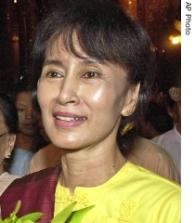2007年VOA标准英语-Burmese Opposition Leader Aung San Suu Kyi to R(在线收听)
Bangkok
25 May 2007
Burma's military leaders have extended their detention of Nobel Laureate Aung San Suu Kyi for another year, despite growing international pressure. Government sources say Burmese officials visited her residence Friday and read out the extension of her term. Ron Corben reports from Bangkok.
 |
| Aung San Suu Kyi (May 2002 file photo) |
The calls came from fellow Nobel Prize laureates, past and current world leaders, and human rights groups. The U.S. government has said that she should be freed and Burma should implement political reforms quickly.
The head of the National League for Democracy has been detained continuously since May 2003, when she was taken into custody after a pro-government mob attacked her supporters while she was visiting rural Burma. She has spent 11 of the past 17 years in confinement.
Debbie Stothardt, spokeswoman for the rights group the Alternative ASEAN Network, says the government fears releasing Aung San Suu Kyi could lead to unrest from her many supporters, and from rising public anger over the country's economic problems.
"The regime is definitely not releasing Aung San Suu Kyi. But it's not because of international pressure, it's because of their own fear of what could happen if Aung San Suu Kyi is released and there's a national uprising against them," said Stothardt.
Naing Aung, a former Burmese student leader and democracy rights advocate, says the government will detain Aung San Suu Kyi until a new constitution - now being drafted - is completed.
"The military regime doesn't want to have any dialogue with Aung San Suu Kyi and they don't think that they need to talk to solve their problems together," he said.
Politicians from the Association of South East Asian Nations have demanded that regional governments push Burma to free more than 1,100 political prisoners, including Aung San Suu Kyi.
Kraisak Choonhavan, a former Thai senator and rights advocate, says the ASEAN politicians have worked hard at raising the issue.
"We have been very diligent in persevering for the release of all political prisoners in Burma, and our agenda has been very, very consistent with our principles, but this extension of the detention of Aung San Suu Kyi is absolutely unacceptable, absolutely unacceptable," he said.
Stothardt of the Alternative ASEAN Network says rights groups will continue to work for change in Burma.
"We need an increase in domestic and international pressure on this regime so finally they have no choice but they have to release Aung San Suu Kyi and they have no choice but to democratize," said Stothardt.
The country has been under a military government since 1962. The National League for Democracy won a landside victory in elections in 1990, but the military refused to acknowledge the results. The government has promised general elections after a new constitution is drafted, but there is no indication of when that will be.